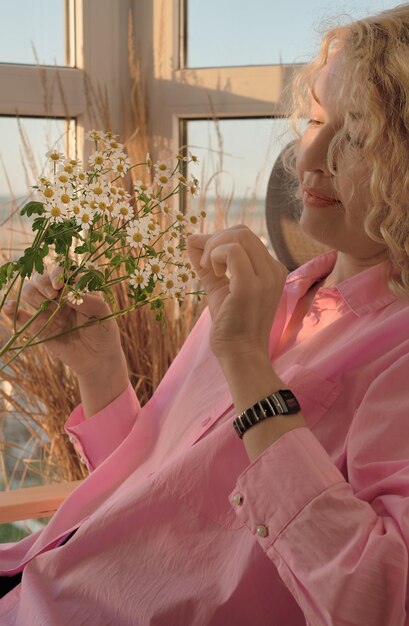
Menopause marks a significant transition in a woman’s life as her body naturally phases out of its reproductive cycle. During this time, periods become irregular and eventually stop altogether as the body prepares to end menstruation. This phase brings a variety of symptoms, which can range from mildly noticeable to intense and bothersome. While some women experience minimal effects, others find daily life challenging and may require treatment to manage the symptoms effectively and ease through this new stage of life.
This hormonal shift can cause noticeable changes, both physically and emotionally. Common symptoms include mood swings, anxiety, depression, fatigue, hot flashes, night sweats, decreased libido, and vaginal dryness. Menopause typically begins between the ages of 40 and 55, with an average onset around 51 years. In some cases, women may experience menopause earlier, often due to underlying medical issues or treatments like the removal of ovaries.
Menopausal symptoms can last several years, sometimes extending over a decade before periods fully stop. These symptoms vary widely in type and intensity from one woman to another. While some view menopause as a liberating end to monthly periods, others struggle to maintain their usual routines. For those needing relief, there are several effective treatments and lifestyle changes to help make this transition smoother.
### Stages of Menopause
Menopause unfolds in three distinct stages:
1. **Perimenopause**: This refers to the transition leading up to menopause. It begins before the final menstrual cycle and continues for about 12 months after it ends.
2. **Menopause**: Officially, menopause starts 12 months after your last period or due to medical reasons, such as ovary removal.
3. **Postmenopause**: This stage occurs once menopause is complete. At this point, a woman will no longer have periods for the rest of her life. Determining the exact start of postmenopause can be tricky.
### Treatment Options
Menopause isn’t an illness—it’s a natural phase of life. Treatment focuses on managing symptoms and reducing the risk of conditions like heart disease, diabetes, and osteoporosis that can develop with age. Here are some common approaches:
– **Hormone Therapy**: Estrogen therapy effectively reduces hot flashes and helps with symptoms linked to hormonal imbalances. If you still have your uterus, your doctor may combine estrogen with progestin. Short-term hormone therapy is usually safe, but long-term use carries risks like heart disease and cancer.
– **Vaginal Estrogen**: For vaginal dryness and related discomforts, estrogen-rich creams, rings, or tablets can be applied directly to the vagina. These treatments release small amounts of estrogen that improve vaginal tissue health.
– **Medications for Osteoporosis**: Women with significant bone loss or osteoporosis may be prescribed drugs to improve bone strength and supplements like vitamin D to maintain healthy bones.
– **Low-Dose Antidepressants**: For hot flashes and mood-related symptoms, doctors may recommend selective serotonin reuptake inhibitors (SSRIs). These are a good alternative for women who cannot take hormonal treatments.
– **Clonidine and Gabapentin**: Though originally for treating high blood pressure or seizures, these medications also ease hot flashes in some women, especially for those who cannot undergo hormone therapy.
It’s always essential to consult a healthcare provider before starting any treatment to weigh the benefits and risks specific to your health.
### Lifestyle Changes and Home Remedies
For many women, small changes in daily habits and home remedies can significantly ease menopausal symptoms:
– **Maintain a Healthy Weight**: Hormonal changes, genetics, and lifestyle factors often lead to weight gain, especially around the midsection. Losing even 10% of your body weight can alleviate symptoms like hot flashes and night sweats while reducing health risks like diabetes and heart disease.
– **Address Vaginal Dryness**: Over-the-counter lubricants and moisturizers can quickly relieve discomfort. Avoid products with glycerin if you’re sensitive to it, as it can cause irritation. Staying sexually active can also improve blood flow to the vaginal area, alleviating dryness.
– **Avoid Trigger Foods**: Foods like caffeine, alcohol, and spicy or sugary items can worsen symptoms like night sweats and mood swings, especially when consumed at night. Keeping a diary to track your triggers can help you make dietary adjustments.
– **Eat Calcium and Vitamin D-Rich Foods**: Bone health is especially critical during menopause. Foods like dairy products, leafy greens, tofu, beans, and fortified cereals provide a rich source of calcium. Sunlight exposure and foods like fish, eggs, and fortified juices or supplements can supply the vitamin D your body needs.
– **Incorporate Fruits and Vegetables**: Fresh produce is nutrient-dense and low in calories, which can help manage weight and reduce menopause symptoms. These foods may also lower the risk of heart disease, diabetes, and osteoporosis in the postmenopausal stage.
– **Include Phytoestrogens**: Found in foods like flaxseeds, soybeans, sesame seeds, and tofu, these natural plant compounds mimic estrogen in the body and can help balance hormones. Choose whole food sources over supplements for the best results.
– **Exercise Regularly**: Staying active improves physical and mental health during menopause. Regular exercise strengthens bones and joints, boosts energy, and reduces stress. Though it may not directly alleviate hot flashes, it can significantly enhance overall well-being.
– **Stay Hydrated**: Hormonal changes can lead to dehydration, causing issues like dry skin and fatigue. Drinking 8–12 glasses of water daily combats dehydration, reduces bloating, and helps maintain a healthy weight.
Additionally, relaxation techniques like deep breathing, yoga, or guided imagery can ease symptoms. Dressing in layers, taking cool showers, or sipping cold water can also provide quick relief from hot flashes.
### Final Thoughts
Not every woman needs extensive treatment, as menopause symptoms often lessen naturally over time. However, if your symptoms are severe or disrupt your daily life, seeking medical advice can help. With the right combination of treatments, home remedies, and lifestyle adjustments, you can navigate this phase of life with greater comfort and confidence.